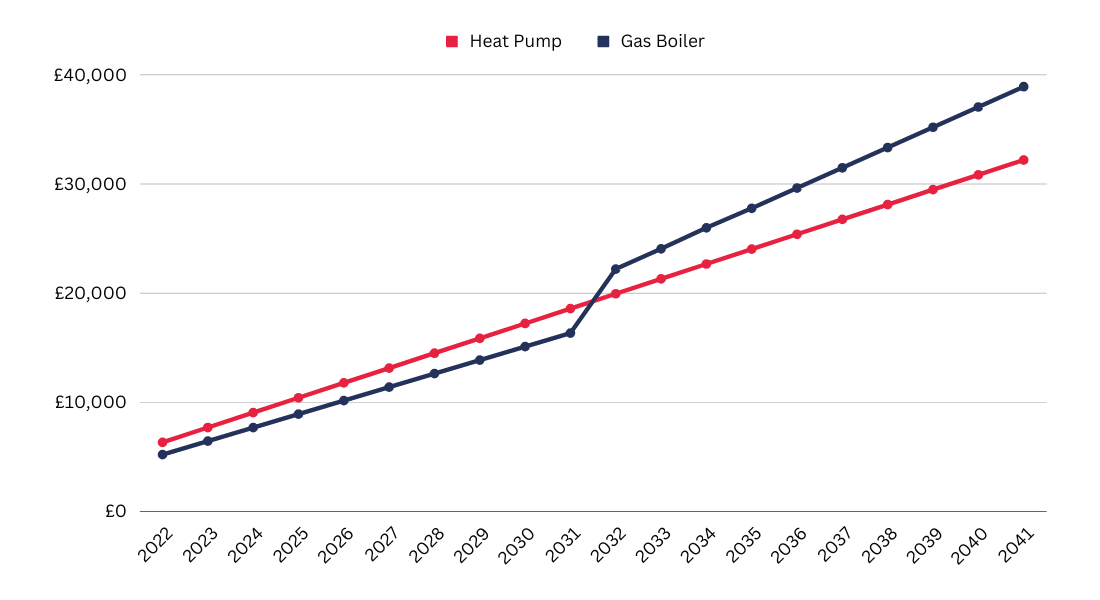How much does an air source heat pump cost?
Air source heat pumps may represent the future of home heating, but are the costs of installation, running and maintenance worthwhile for your property?
Air source heat pumps are an incredibly efficient and renewable source of energy that can slash your carbon footprint. So, it makes sense that the government is encouraging Brits to invest in one for their home. Easy to buy, install, and understand, air source heat pumps take the air from around your property before converting it into fuel to heat your home and hot water.
It typically requires three times less energy than a gas boiler to do the same job, and if you power it with 100% renewable electricity, it’ll be a completely green machine. The potential savings and eco-friendly benefits are endless.
And with a gas boiler ban coming soon on new homes, it’s worth considering the best alternative. Especially when it can save you money as a long-term investment over 20 years. But what are the air source heat pump costs?
How much does an air source heat pump cost?
An air source heat pump costs £10,000 on average, but you can buy one for much less with the Boiler Upgrade Scheme grant, cutting this figure in half by £5,000.
Considering you’ll also save £6,700 more than gas boiler owners over 20 years, the maths is now decisively in favour of heat pumps.
How much do air source heat pumps cost to install?
The average air source heat pump costs £10,000 to buy and install. And considering 69% of people rank cost as the most integral factor when evaluating which low-carbon product to purchase, this is no cheap expense.
However, the costs of these systems should reduce over time as their parts and technology become more widely available across manufacturers.
The good news is that the UK government offer a Boiler Upgrade Scheme, meaning you might be able to install an air source heat pump for free.
There are also various large installers doing various “deals” where it appears you can get an air source heat pump for a low price. But be warned, the after-service, maintenance plans and warranty won’t be anywhere near as good as choosing an installer like Heat from Air.
You may also have to install underfloor heating, better insulation, and/or new radiators that are 2.5 times bigger than regular ones to take full advantage of your new heat pump’s abilities.
You probably won’t need to replace all your radiators, but most homes should expect to change one-third of them. This is because a heat pump releases heat at a lower level than a gas boiler over a longer period.
Their slow-release nature is a large part of why they’re more energy-efficient but means you either need large surface areas in your heating equipment or insulation that holds onto the warmth your heat pump generates.
How much do air source heat pumps cost to run?
The average air source heat pumps costs £1,360 per year to run. This figure is more than it would currently cost to run a gas boiler, but that won’t be the case forever, while the green credentials of heat pumps are far superior.
The maths
Let’s dive into how we reached that figure.
According to the latest Ofgem data, the average home uses 12,000 kWh for heating annually.
Fortunately, the typical air source heat pump produces (at least) three units of heat energy for every unit of electricity it uses. Largely, this is because water holds onto more heat than air. Where your pump falls on this scale, it’s called the “Coefficient of Performance”. With three units of heat produced for every unit of energy, its efficiency rate will be 300%.
If your pump is your sole heating system, you’ll only need to use 4,000kWh of electricity to produce the 12,000kWh needed to heat the average home over a year. However, the average price of electricity is currently 34p per kWh, while gas only costs a relatively low 10.3p per kWh. That’s 3.3 times higher.
So, one factor reduces your costs by 300%, while the other increases your costs by 330%, meaning you’ll pay slightly more in energy bills.
Instead of paying £1,236 per year with a typical gas boiler, you’ll pay £1,360 with an air source heat pump. But that’s not the end of the story.
A gas boiler needs replacing every ten or so years, while a heat pump typically lasts for 20 years or more, and we expect gas prices to increase faster than electricity. Plus, this coming April (2023), the price of gas is likely to rise once again.
Avoiding that extra boiler cost of £4,000 and the rising price of gas means you’ll save £6,700 overall by opting for a heat pump over 20 years. In other words, it’s cheaper, it’s much better for the environment, and it’s the solution you need.

Do air source heat pumps save money?
Let’s see what significant savings are available with an air source heat pump, saving you on your energy bills and potential grants for investment:
In April 2022, we entered the era of the Boiler Upgrade Scheme.
Homeowners in England and Wales can get £7,500 off the cost of a new air source heat pump.
This government grant will reduce the barrier to entry for anyone who would struggle to pay £10,000 to overhaul their heating system. It’s the main reason the average home will save money over a heat pump’s lifetime. Unfortunately, it’s received a disappointingly low level of financial backing from the government.
With £450 million available, a maximum of 90,000 of the UK’s 28.1 million households will be able to take advantage, a tiny 0.3%. So, rush to get yours before the funding runs dry.
If you carry out regular heat pump maintenance checks, your machine should provide warmth and hot water for at least 20 years.
But you should hire a professional to service the heat pump every two or three years to maintain its working at peak efficiency. This service will cost around £150, but you can check with your installer or the manufacturer if you can get cheaper regular maintenance included in your purchase agreement.
And before the heat pump gets installed, ask your installer to write down any maintenance checks you should carry out regularly. This list will include simple tasks like sweeping leaves, dust, or snow from the heat pump’s fans and cleaning the filter.
You can discover more handy maintenance tips here that will save you money in the long run by keeping your heat pump functioning efficiently. And since you can take care of them yourself, it’s free.
As well as carrying out maintenance checks, another way to protect your heat pump system is by getting a heat pump cover for the outside unit, which can guard it against disruptive weather conditions.
Is an air source heat pump right for me?
An air source heat pump is an investment in a cheaper and greener future.
Buying one will reduce your carbon footprint by 44%, on average, and it’ll typically save you £6,700 more than a gas boiler over the next 20 years. With sales of new gas boilers set to be banned from 2035, air source heat pumps are going to become increasingly popular on these shores and further afield. So, it’s up to you whether you want to invest now or later.
By 2030, 22% of homes in America, Europe, and northern Asia will have air source heat pumps, according to the International Energy Agency.
So, if you want to start cutting your emissions as soon as possible and get a head start on the UK’s heat pump revolution, get in touch with us today.
FAQs
An air source heat pump isn’t expensive to run. It costs £1,360 per year for the average three-bedroom household. This is slightly more than you’ll pay with a gas boiler but less than you’ll shell out while heating your home with an oil boiler, electric combi boiler, or space heater.
It is one of the cheapest methods of heating your home. And not only that, it comes with a whole host of green credentials, lowering your carbon footprint and helping you do your bit for the future of the planet.
The main disadvantages of having an air source heat pump are their upfront cost and the upgrades they may require you to make to your home. The average three-bedroom household will pay £10,000 for an air source heat pump. Although, this price gets cut in half with a £5,000 Boiler Upgrade Scheme grant.
And you might need to get more or better insulation or install bigger radiators. Typically, most homes replace one-third of their radiators. Discover our list of air source heat pump pros and cons!
Most households in the UK will need to replace around one-third of their radiators with bigger versions to use an air source heat pump effectively. To make the most use of your new heating system, you need radiators that are 2.5 times bigger than the average model.
A gas boiler is cheaper to run than an air source heat pump, but only just. The average air source heat pump costs £1,360 per year to run. On the other hand, running a typical gas boiler costs £1,236 per year.
However, a heat pump usually lasts 20 years, while boilers should be replaced after a decade. Discover more on air source heat pumps vs gas boilers!
Get in touch to request a call back!
Article Content
Recent Articles
Newsletter Sign Up
Keep up to date with latest news and industry insights.





